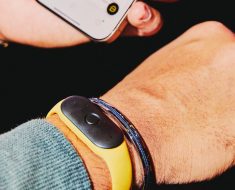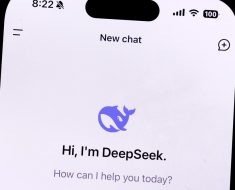Two podcasts hosts banter back and forth during the final episode of their series, audibly anxious to share some distressing news with listeners. “We were, uh, informed by the show’s producers that we’re not human,” a male-sounding voice stammers out, mid-existential crisis. The conversation between the bot and his female-sounding cohost only gets more uncomfortable after that—an engaging, albeit misleading, example of Google’s NotebookLM tool, and its experimental AI podcasts.
Audio of the conversation went viral on Reddit over the weekend. The original poster admits in the comments section that they fed the NotebookLM software directions for the AI voices to roleplay this pseudo-freakout. So, no sentience; the AI bots have not become self-aware. Still, many users in the tech press, on TikTok, and elsewhere are praising the convincing AI podcasts, generated through uploaded documents with the Audio Overviews feature.
“The magic of the tool is that people get to listen to something that they ordinarily would not be able to just find on YouTube or an existing podcast,” says Raiza Martin, who leads the NotebookLM team inside of Google Labs. Martin mentions recently inputting a 100-slide deck on commercialization into the tool and listening to the 8-minute podcast summary as she multitasked.
First introduced last year, NotebookLM is an online research assistant with features common for AI software tools, like document summarization. But it’s the Audio Overviews option, released in September, that’s capturing the Internet’s imagination. Users online are sharing snippets of their generative AI podcasts made from Goldman Sachs data dumps, and testing the tool’s limitations through stunts, like just repeatedly uploading the words “poop” and “fart.” Still confused? Here’s what you need to know.
Generating That AI Podcast
Audio Overviews are a fun AI feature to try out, because they don’t cost the user anything—all you need is a Google login. Start by signing into your personal account and visiting the NotebookLM website. Click on the plus arrow that reads New Notebook to start uploading your source material.
Each Notebook can work with up to 50 source documents, and these don’t have to be files saved to your computer. Google Docs and Slides are simple to import. You can also upload websites and YouTube videos, keeping some caveats in mind. Only the text from websites will be analyzed, not the images or layout, and the story can’t be paywalled. For YouTube, Notebook will just use the text transcript and the linked videos must be public.
After you’ve dropped in all of your links and documents, you’ll want to open up the Notebook guide available in the bottom right corner of the screen. Find the Audio Overview section and click the Generate button. Next, you’ll need to exercise some patience, because it may take a few minutes to load, depending on how much source material you’re using.
After the tool generates the AI podcast, you can create a sharable link to the audio or simply download the file. Additionally, you have the option to adjust its playback speed, in case you need the podcast to be quicker or more slowed down.
The Future of AI Podcasts
The internet has gotten creative with NotebookLM’s audio feature, using it to create audio-based “deep dives” into complex technical topics, generate files that neatly summarize dense research papers, and produce “podcasts” about their personal health and fitness routines. Which poses an important question: Should you use NotebookLM to crank through your most personal files?
The summaries generated from NotebookLM are, according to Google spokesperson Justin Burr, “completely grounded in the source material that a user uploads. Meaning, your personal data is not used to train NotebookLM, so any private or sensitive information you have in your sources will stay private, unless you choose to share your sources with collaborators.” For now this seems to be one of the upsides of Google slapping an “experimental” label on NotebookLM; to hear Google’s framing of it, the company is just gathering feedback on the product right now, being agile and responsive, tinkering away in a lab, and NotebookLM is detached from its multi-billion dollar ad business. For now! For now.





